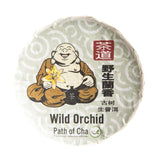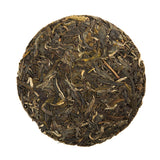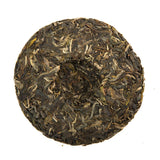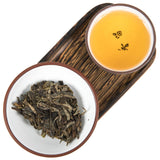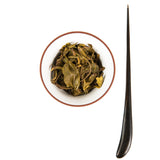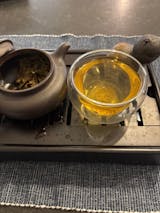Sitting above the clouds on Mt. Wuliang in Yunnan, Lao Cha and his disciple were just about to finish their morning tea meditation.
— Sifu! I am so full of energy! I feel it flowing all throughout my body, blooming like the orchids that surround us.
— Of course, those are the effects of the Wild Orchid Gushu Raw Pu-erh. Now, let's make our ascent. It's time we share these tea cakes with the world.
GuShu (古树) is one of the most desired tea types throughout the world. Tea enthusiasts are going out of their way to acquire exceptional GuShu. Gushu means ancient tea tree, and Gushu tea is made from old tea trees aged 100 years and up.
Our "Wild Orchid Aroma" GuShu Raw Pu-erh comes from tea trees that grow at the high altitudes of Mt. Wuliang in Yunnan. The taste is pleasantly astringent, sweet, and sour — an ideal equilibrium. You'll feel luscious notes of wild orchids and green apples when brewing the tea.
Arguably, ancient tea trees have Cha Qi (茶气 – energy) like no other. The deep-rooted bushes acquire all the minerals, nutrients, and, of course, spirit that the pure tea-growing land of Yunnan has to offer. We invite you to try our Wild Orchid Gushu to experience its effects for yourself. Be careful not to become too tea drunk!
Wuliang Mountain - meaning Endless Mountain - is a famous tea-growing region near Pu'er City in Yunnan. It has been an essential source of high-quality Pu'er tea since ancient times. Here is how the ancients described this piece of land a long time ago: "Its towering heights penetrate the clouds – one can't climb it. Its surface is so vast – one can't measure it." According to the legend, tea cultivation in the region began more than 2000 years ago with the mythical Zhuge Liang teaching the people how to grow and process tea leaves. Although this might be hard to prove, the local Yi minority claims they have cultivated tea on the mountain's slopes for 60 generations now.
Wuliang Mountain has a unique tea-growing environment. Tall and majestic, stretching for hundreds of miles, it reaches 3000 meters above sea level. Its lowest point is still above 1000 meters. The abundant rainfall and mild climate form a natural surrounding veiled in clouds and mists throughout the year. The tea gardens mainly consist of old wild trees scattered in a belt of 1600 - 2200 meters above sea level. The superior natural conditions create a unique terroir for locally grown tea.
The tea balances well between sweetness and bitterness while retaining a longer, mouthwatering astringency. It then subsides into a long-lasting Hui Gan (回甘 – sweet aftertaste). The soup is bright yellow-green, and it has a rich and thick mouthfeel with pronounced Shanye (山野 – "wild mountain" flavor).
Brewing guidelines:
![]() 212℉ / 100℃
212℉ / 100℃
 1g per 70-100ml
1g per 70-100ml ![]() 3-5min
3-5min
 1g per 20ml
1g per 20ml ![]() 5sec + 5sec for each subsequent infusion
5sec + 5sec for each subsequent infusion





